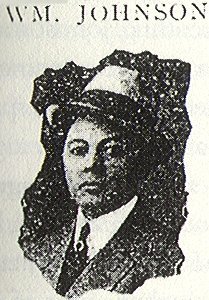William Manuel Johnson
Bill Johnson | |
|---|---|
 Johnson in 1909 | |
| Background information | |
| Birth name | William Manuel Johnson |
| Born | August 10, 1872[1] Talladega, Alabama |
| Died | December 3, 1972 New Braunfels, Texas, U.S. |
| Genres | Jazz, dixieland |
| Occupation | Musician |
| Instrument | Double bass |
| Years active | 1880s–1950s |
| Formerly of | The Original Creole Orchestra, King Oliver's Creole Jazz Band, Bill Johnson's Louisiana Jug Band |
William Manuel "Bill" Johnson (August 10, 1872 - December 3, 1972) was an American jazz musician who played banjo and double bass;[2] he is considered the father of the "slap" style of double bass playing.[3]
In New Orleans, he played at Lulu White's legendary house of prostitution, with the Eagle Band, and with the Excelsior Brass Band.[4] Johnson claimed to have started "slapping" the strings of his bass (a more vigorous technique than the classical pizzicato) after he accidentally broke his bow on the road with his band in northern Louisiana in the early 1910s. Other New Orleans string bass players picked up this style, and spread it across the country with the spread of New Orleans Jazz.[5][6]
Johnson was founder and manager of the first jazz band to leave New Orleans and tour widely in the 1910s, The Original Creole Orchestra.[6] They participated in vaudeville skits centered around the "Uncle" character and the "boys," performing in the Midwest, Northwest, and Canada.[7] He brought the Creole Band to Chicago in 1915.[4] Johnson and his band played an instrumental role in establishing Royal Gardens (later known as Lincoln Gardens), as one of the great jazz clubs in Chicago; a location they were residence at beginning in 1918.[8]
In Chicago during the early 1920s he assembled King Oliver's Creole Jazz Band, considered perhaps the best of the early ensemble style jazz bands. He taught younger Chicago musicians (including Milt Hinton) his "slap" style of string bass playing. He made many recordings in Chicago in the late 1920s.[5] He notably says "Oh play that thing" into the horn during the recording of "Dippermouth Blues" in 1923 with King Oliver's Creole Jazz Band.[9]
Johnson continued to play with various jazz bands and orchestras into the early 1950s, sometimes working under other names. He was also involved in the import/export business along the Mexico–United States border.[6]
Johnson's younger half-brother Ollie "Dink" Johnson was also a noted musician. Jelly Roll Morton's common law wife from 1917 to 1922, Anita Gonzales (Bessie Johnson), was Bill Johnson's half-sister.[10]
Bill Johnson died in New Braunfels, Texas in 1972.[6]
References
[edit]- ^ "When he registered for the draft at Local Board No. 3 in Chicago on 12th September 1918, Bill [Johnson] gave his date of birth as 10th August 1874, which confirms the details for his birth year recorded in the 1880 U.S. Census in the entry for the Johnson family in Montgomery, Alabama. Other birth dates on U.S. Census records (1876, 1879 and 1882) and the date on his death certificate (1872) would appear to be incorrect."
- ^ Brothers, Thomas (2014). Louis Armstrong: Master of Modernism. New York, NY: W.W. Norton & Company. p. 18. ISBN 978-0-393-06582-4.
- ^ Singleton, Joan (2011). Keep It Real: The Life Story of James "Jimmy" Palao "The King of Jazz". iUniverse. pp. 1–. ISBN 978-1-4620-0721-9.
- ^ a b Brothers, Thomas (2014). Louis Armstrong: Master of Modernism. New York, NY: W.W. Norton & Company. p. 20. ISBN 978-0-393-06582-4.
- ^ a b Gushee, Lawrence (April 29, 2010). Pioneers of Jazz: The Story of the Creole Band. Oxford University Press. pp. 65–. ISBN 978-0-19-988979-2.
- ^ a b c d "William Manuel Johnson". Memim Encyclopedia.
- ^ Brothers, Thomas (2014). Louis Armstrong: Master of Modernism. New York, NY: W.W. Norton & Company. p. 26. ISBN 978-0-393-06582-4.
- ^ "Nightclubs and other venues; Lincoln Gardens [Royal Gardens]". Grove Music Online. Oxford Music Online. Oxford University Press. 2001. doi:10.1093/gmo/9781561592630.article.J330000.
- ^ Brothers, Thomas (2014). Louis Armstrong: Master of Modernism. New York, NY: W.W. Norton & Company. p. 150. ISBN 978-0-393-06582-4.
- ^ Levin, Floyd (2000). Classic Jazz: A Personal View of the Music and the Musicians. University of California Press. p. 114. ISBN 0520213602. Retrieved October 11, 2020.
External links
[edit]- William Manuel Johnson's family
- William Manuel Johnson's WWI Draft Registration Card and essay
- Bill Johnson (1872-1972) at The Red Hot Jazz Archive
- Dixieland jazz musicians
- Jazz musicians from New Orleans
- People from New Braunfels, Texas
- American jazz double-bassists
- American male double-bassists
- African-American jazz musicians
- Musicians from New Braunfels, Texas
- 1972 deaths
- Slap bassists (double bass)
- American male jazz musicians
- The Eagle Band members
- 20th-century African-American musicians
- 20th-century Jazz musicians from New Orleans
- 21st-century Jazz musicians from New Orleans
